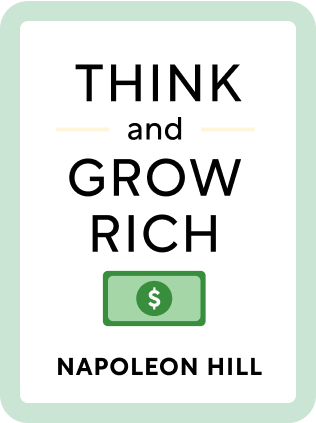

This article is an excerpt from the Shortform book guide to "Think and Grow Rich" by Napoleon Hill. Shortform has the world's best summaries and analyses of books you should be reading.
Like this article? Sign up for a free trial here .
Are your thoughts leading you in directions that you truly want to go? What do you wish you could replace your fears with?
Napoleon Hill’s Think and Grow Rich is a classic guide to success. First published in 1937, following the Great Depression, the book was immediately welcomed as an antidote to hard times and remained a bestseller for decades.
Continue reading to find several Think and Grow Rich exercises that will help you understand and apply the book’s ideas.
11 Think and Grow Rich Exercises
Many people still find Hill’s philosophy of positive thinking and the book’s specific steps for achieving wealth both relevant and life-changing. Hill contends that our thoughts become our reality, and he offers principles and a plan for transforming thoughts into riches.
You can do these 11 Think and Grow Rich exercises individually or with a group to turn the book’s principles into a plan in a concrete way.
Exercise #1: Control Your Thoughts
People who achieve success do so because they have a success-consciousness—they spend their time thinking about success rather than doubting themselves or thinking about things that can go wrong.
- What do you spend the most time thinking about? Where are these thoughts leading you?
- Describe a time when you tried to ‘stay positive’ in a difficult situation. What was the result?
- What negative thoughts hold you back the most often? How can you invert these to develop successful thoughts?
Exercise #2: Build an All-Consuming Desire
The first step to riches is having an all-consuming desire to achieve your specific goal. You should also specifically picture the goal that your desire will lead you to.
- What one thing do you want more than anything else? What are you willing to do to get it? Be specific for both questions.
- Define your goal in exact terms. Exactly what do you want to achieve? By what date?
- What is the first important step you can take toward achieving your desire? What specifically do you need to do?
Exercise #3: Visualize Your Success
Visualizing the thing or condition you want to achieve makes it seem real and will subconsciously encourage you to act in ways that help you achieve it.
- Close your eyes and visualize something you want intensely. Describe it in as much detail as you can. Write down these details.
- How does visualizing this make you feel, emotionally? Do you feel that your goal is closer after visualizing your success?
- Write your personal, specific version of the following: “I know I have the ability to achieve my specific goal. I demand self-confidence from myself. My goal demands that I develop the self-confidence to achieve it.
Exercise #4: Gain Specialized Knowledge
If you want to get rich, you need specialized knowledge in the area you’re choosing to focus on.
- What specialized knowledge does your goal demand that you don’t currently have? Be specific.
- Where can you get each of the pieces of knowledge you listed above?
- What should you be doing to continue acquiring knowledge in your chosen field?
Exercise #5: Build Your Master Mind Group
You don’t need to have all the answers yourself—you can build a Master Mind group of associates to help you achieve your goal.
- What are the types of people you need in your Master Mind group? What specialized knowledge does each person have that complements you?
- Of all the people you know, who would you invite to be on your Master Mind team? What does each person contribute?
- What do you have to offer to these people to encourage them to join? What would excite them to work toward your goal, with the other Master Mind members?
Exercise #6: Having a Hunch
Your creative imagination, which works in the subconscious, generates new ideas, sometimes through hunches and inspiration.
- What’s a hunch or inspiration you have now that could be interesting?
- Should you develop this inspiration into a reality? How can you do so?
Exercise #7: Deciding with Courage
Successful people make decisions quickly without procrastination, and they don’t get sidetracked from their plans.
- What’s an important decision that you’re struggling to make now? Describe the different options you have to decide on.
- Why is it so difficult? What is preventing you from making a decision?
- What specifically do you need to finalize your decision (e.g., more information of some kind, or some resource)? What concrete steps will you take to gather what you need?
Exercise #8: Examine Your Persistence
If you don’t persist when you run into obstacles, you can’t achieve your goals. So it’s important to identify any signs you lack persistence and to tackle them.
- Review the list of signs that you lack persistence. Which one most applies to you right now? Describe in detail the problem and how it appears in your life.
- Now that you’re aware of this, what are concrete steps you can take to reduce the problem and develop more persistence?
Exercise #9: Removing Your Excuses
Alibis are the excuses we use to justify our failures and mistakes. They usually start with the words, “If only … .”
- What’s a “go-to” excuse you give for not being where you want to be, for not doing what you know you should do, or for failing at something? (If often starts with “if only.”)
- Stop wishing for what you could have, and start planning to get it. Turn your excuse above into a plan. What concrete thing can you do now to make your excuse irrelevant?
Exercise #10: Staring Down Fear
We all fear one or more of the following: poverty (not having enough money), criticism, poor health, loss of love, old age, or death. They can generate worry and paralyze us.
- What’s one of your great fears? What specifically are you worried about?
- You have the ability to replace each fear with positive thinking. What is a statement that would banish your fear?
Exercise #11: Gain Success-Consciousness
People who become rich do so because they have a success-consciousness—they spend their time thinking about success rather than about things that can go wrong.
- Are you success-conscious or failure-conscious? How do you know?
- What thoughts stand in the way of your being success-conscious? What can you replace them with?
- How can being success-conscious improve your life? In what areas?

———End of Preview———
Like what you just read? Read the rest of the world's best book summary and analysis of Napoleon Hill's "Think and Grow Rich" at Shortform .
Here's what you'll find in our full Think and Grow Rich summary :
- Napoleon Hill's 1937 guide to success
- How to use thoughts, visualization, and affirmation to achieve wealth
- The importance of a Master Mind group and how to start one






